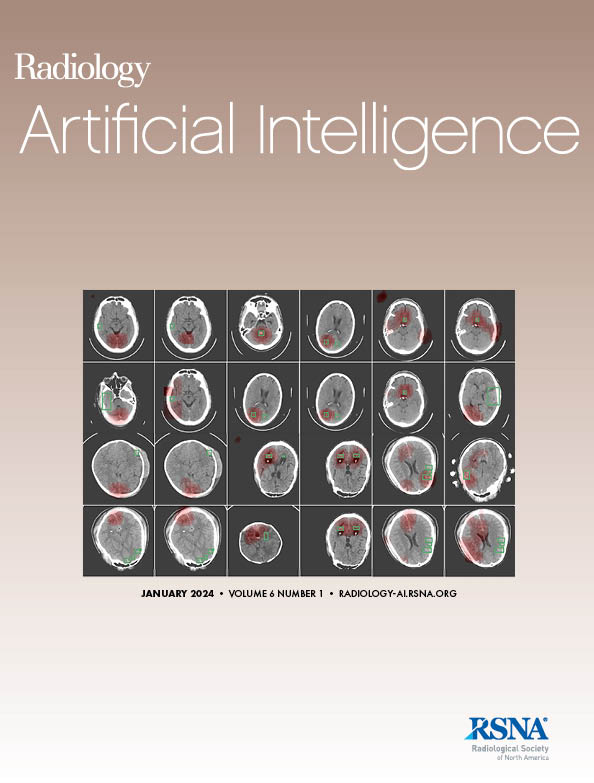Lessons Learned in Building Expertly Annotated Multi-Institution Datasets and Hosting the RSNA AI Challenges.
IF 8.1
Q1 COMPUTER SCIENCE, ARTIFICIAL INTELLIGENCE
Felipe C Kitamura, Luciano M Prevedello, Errol Colak, Safwan S Halabi, Matthew P Lungren, Robyn L Ball, Jayashree Kalpathy-Cramer, Charles E Kahn, Tyler Richards, Jason F Talbott, George Shih, Hui Ming Lin, Katherine P Andriole, Maryam Vazirabad, Bradley J Erickson, Adam E Flanders, John Mongan
下载PDF
{"title":"Lessons Learned in Building Expertly Annotated Multi-Institution Datasets and Hosting the RSNA AI Challenges.","authors":"Felipe C Kitamura, Luciano M Prevedello, Errol Colak, Safwan S Halabi, Matthew P Lungren, Robyn L Ball, Jayashree Kalpathy-Cramer, Charles E Kahn, Tyler Richards, Jason F Talbott, George Shih, Hui Ming Lin, Katherine P Andriole, Maryam Vazirabad, Bradley J Erickson, Adam E Flanders, John Mongan","doi":"10.1148/ryai.230227","DOIUrl":null,"url":null,"abstract":"<p><p>The Radiological Society of North America (RSNA) has held artificial intelligence competitions to tackle real-world medical imaging problems at least annually since 2017. This article examines the challenges and processes involved in organizing these competitions, with a specific emphasis on the creation and curation of high-quality datasets. The collection of diverse and representative medical imaging data involves dealing with issues of patient privacy and data security. Furthermore, ensuring quality and consistency in data, which includes expert labeling and accounting for various patient and imaging characteristics, necessitates substantial planning and resources. Overcoming these obstacles requires meticulous project management and adherence to strict timelines. The article also highlights the potential of crowdsourced annotation to progress medical imaging research. Through the RSNA competitions, an effective global engagement has been realized, resulting in innovative solutions to complex medical imaging problems, thus potentially transforming health care by enhancing diagnostic accuracy and patient outcomes. <b>Keywords:</b> Use of AI in Education, Artificial Intelligence © RSNA, 2024.</p>","PeriodicalId":29787,"journal":{"name":"Radiology-Artificial Intelligence","volume":" ","pages":"e230227"},"PeriodicalIF":8.1000,"publicationDate":"2024-05-01","publicationTypes":"Journal Article","fieldsOfStudy":null,"isOpenAccess":false,"openAccessPdf":"https://www.ncbi.nlm.nih.gov/pmc/articles/PMC11140499/pdf/","citationCount":"0","resultStr":null,"platform":"Semanticscholar","paperid":null,"PeriodicalName":"Radiology-Artificial Intelligence","FirstCategoryId":"1085","ListUrlMain":"https://doi.org/10.1148/ryai.230227","RegionNum":0,"RegionCategory":null,"ArticlePicture":[],"TitleCN":null,"AbstractTextCN":null,"PMCID":null,"EPubDate":"","PubModel":"","JCR":"Q1","JCRName":"COMPUTER SCIENCE, ARTIFICIAL INTELLIGENCE","Score":null,"Total":0}
引用次数: 0
引用
批量引用
Abstract
The Radiological Society of North America (RSNA) has held artificial intelligence competitions to tackle real-world medical imaging problems at least annually since 2017. This article examines the challenges and processes involved in organizing these competitions, with a specific emphasis on the creation and curation of high-quality datasets. The collection of diverse and representative medical imaging data involves dealing with issues of patient privacy and data security. Furthermore, ensuring quality and consistency in data, which includes expert labeling and accounting for various patient and imaging characteristics, necessitates substantial planning and resources. Overcoming these obstacles requires meticulous project management and adherence to strict timelines. The article also highlights the potential of crowdsourced annotation to progress medical imaging research. Through the RSNA competitions, an effective global engagement has been realized, resulting in innovative solutions to complex medical imaging problems, thus potentially transforming health care by enhancing diagnostic accuracy and patient outcomes. Keywords: Use of AI in Education, Artificial Intelligence © RSNA, 2024.
建立专家注释的多机构数据集和举办 RSNA 人工智能挑战赛的经验教训。
"刚刚接受 "的论文经过同行评审,已被接受在《放射学》上发表:人工智能》上发表。这篇文章在以最终版本发表之前,还将经过校对、排版和校对审核。请注意,在制作最终校对稿的过程中,可能会发现一些可能影响内容的错误。自 2017 年以来,北美放射学会(RSNA)至少每年举办一次人工智能竞赛,以解决现实世界中的医学影像问题。本文探讨了组织这些竞赛所面临的挑战和过程,特别强调了高质量数据集的创建和整理。收集多样化和有代表性的医学影像数据涉及处理患者隐私和数据安全问题。此外,要确保数据的质量和一致性,包括专家标记和考虑各种患者和成像特征,还需要大量的规划和资源。要克服这些障碍,就必须进行细致的项目管理,并严格遵守时间表。文章还强调了众包注释在推动医学影像研究方面的潜力。通过 RSNA 竞赛,实现了有效的全球参与,为复杂的医学影像问题提供了创新的解决方案,从而有可能通过提高诊断准确性和患者疗效来改变医疗保健。©RSNA,2024。
本文章由计算机程序翻译,如有差异,请以英文原文为准。
来源期刊
期刊介绍:
Radiology: Artificial Intelligence is a bi-monthly publication that focuses on the emerging applications of machine learning and artificial intelligence in the field of imaging across various disciplines. This journal is available online and accepts multiple manuscript types, including Original Research, Technical Developments, Data Resources, Review articles, Editorials, Letters to the Editor and Replies, Special Reports, and AI in Brief.

 求助内容:
求助内容: 应助结果提醒方式:
应助结果提醒方式:


